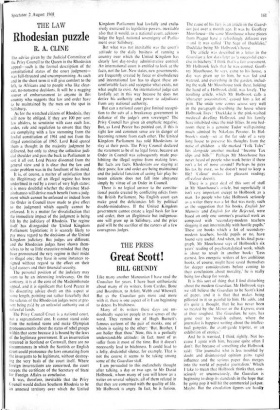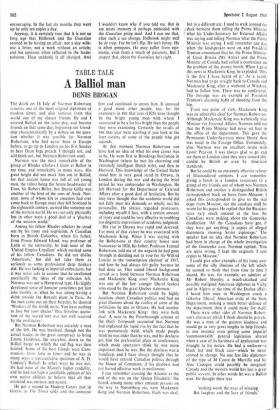Great Scott!
THE PRESS BILL GRUNDY
Like many another Mancunian I have read the Guardian for years. I have been enthusiastic about many of its writers, from Cardus, Bone and Boardman, to Arlott, Webb and Whewell. But as the Guardian gets more and more with it, there is one aspect of it I am beginning to detest. Its bitchiness.
Many of its writers these days are un- doubtedly superior people in two senses of the word. They remind me of Hugh Burnett's famous cartoon of the pair of monks, one of whom is saying to the other: 'But, Brother, I am holier than thou.' Now, this is a perfectly understandable attitude: in fact, most of us suffer from it most of the time. But it doesn't necessarily lead to bitchiness. It could lead to a lofty, disdainful silence, for example. That is not the course it seems to be taking among some of the Guardian staff.
I am persuaded to this melancholy thought after talking, a day or two ago. to Mr David Holbrook, whom many of you will know as a writer on several subjects, all of them related in that they are concerned with the quality of life. Mr Holbrook is angry. In fact, he is furious.
The cause of his fury is an article in the Guard- ian just over a month ago. It was by Geoffrey Moorhouse—the same Moorhouse whose pieces from Prague have a refreshingly different eye —and it was called 'The Sage of Ducklake,' Ducklake being Mr Holbrook's house.
The article was described in a letter in the Guardian a few days later as 'a successful exer-
cise in bitchery.' I think that's a fair assessment.
Mr Holbrook feels that he was conned. Geoff- rey Moorhouse, he says, came to his house, a
day was given up to him, he was fed and
watered, and everything in the garden, includ- ing the walk Mr Moorhouse took there, holding the hand of a Holbrook child, was lovely. The resulting article, which Mr Holbrook calls a 'character assassination.' caused him a lot of
pain. The snide tone comes across very well in the paragraph describing the house where Holbrook lives : 'Ducklake is the pink-washed medieval dwelling Holbrook and his family have inhabited since the mid-'fifties. In one bed- room there is a genuine Tudor wall-painting much admired by Nikolaus Pevsner. In Hol- brook's study—set at the far side of a very long house to preserve his thoughts from the noise of children a tile marked "Folk Tales"
lies alongside another marked "Income Tax slips and bills."' Perhaps Mr Moorhouse has never heard of people who work better if there isn't a lot of noise around? Perhaps he pays his tax by wive, so he doesn't need to keep a file? 'Colour' makes for pleasant reading; off-colour doesn't.
There is a great deal of this sort of stuff in Mr Moorhouse's article, but superficially it isn't very important except to Holbrook as a man. To people who take Holbrook seriously as a writer there was a lot that was nasty, such as the suggestion that his books, English for Maturity and English for the Rejected, were based on only one summer's practical work as compared with 'secondary-modern teachers slogging it out interminably with hostile pupils: These are books which a lot of secondary- modern teachers, hostile pupils or no, have found very useful. And when, in his final para- graph, Mr Moorhouse says of Holbrook's six years' reading of psychoanalytical work, which is about to result in another book: 'Less earnest, less energetic writers of less ambitious books, of course, might have saved themselves for deeper considerations before coming to their conclusions about morality,' he is really being too cheap for words.
It is this sort of thing that I find disturbing about the modern Guardian. Mr Holbrook says we still believe the Guardian to be Scott's kind of paper, and it is that that makes being pilloried in it so painful to him. He adds, and it's quite a thought, that he has never been so treated by the Mirror or the Express, even at their roughest. The Guardian, he says, has gone over to 'modish culture, where the journalist is happiest writing about the intellec- tual gangster, the avant-garde tripstcr, or an exhibition of erotica.'
And he is worried, I think rightly. Not be- cause I agree with him, because quite often I don't. But because of something else Holbrook said: 'The journalist who is less troubled by doubt and disinterested opinion gains rapid influence and the serious paper thus merges into the world of popular journalism.' Which I take to mean that Holbrook thinks that, con- sciously or unconsciously, the Guardian is beginning to drop its standards in the hope that by going pop it will hit the commercial jackpot. Maybe. But the circulation figures are hardly encouraging. In the last six months they went up by only ten copies a day.
Anyway, it is certainly true that it is not so long ago that Holbrook and the Guardian seemed to be having an affair; not a day with- out a letter, not a week without an article; and his opinions often reflected in the leader columns. Then suddenly it all changed. And
I wouldn't know why if you told me. But in my misty memory it perhaps coincided with the Guardian going mod. And I can see that, after such a sea change, Holbrook might well be de trop. For he isn't flip. He isn't funny. He is often pompous. He may- suffer from ego- mania, even from a touch of paranoia. But I suspect that, about the Guardian, he's right.







































 Previous page
Previous page